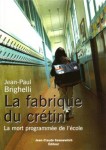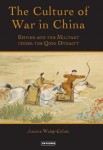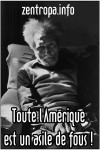mercredi, 25 avril 2007
Mort programmée de l'école

La fabrique du crétin
La mort programmée de l'école
16,90 euros
Nos enfants ne savent plus lire, ni compter, ni penser. Le constat est terrible, et ses causes moins obscures qu'on ne veut bien le dire. Un enchaînement de bonnes intentions mal maîtrisées et de calculs intéressés a délité en une trentaine d'années ce qui fut l'un des meilleurs systèmes éducatifs au monde. Faut-il incriminer les politiques, les profs, les parents, les syndicats, les programmes ? En tout cas, la Nouvelle Pédagogie a fait ses « preuves » : l'école a cessé d'être le moteur d'un ascenseur social défaillant. Ceux qui sont nés dans la rue, désormais, y restent. Dès lors, que faire ?
Jean-Paul Brighelli analyse avec une lucidité féroce, sans nostalgie exagérée, cette école de la réussite devenue si souvent école de l'échec programmé et donne des solutions pour une école de demain. Normalien, agrégé de Lettres, il a, du collège à l'université, parcouru l'essentiel du paysage éducatif. Longtemps impliqué dans l'édition scolaire et para-scolaire, il en démonte au passage les mécanismes et les intérêts convergents.
ENTRETIEN AVEC JEAN-PAUL BRIGHELLI : http://www.sauv.net/brigh4verites.php
06:15 Publié dans Ecole/Education | Lien permanent | Commentaires (0) |  |
|  del.icio.us |
del.icio.us |  |
|  Digg |
Digg | ![]() Facebook
Facebook
Affiche Ezra Pound
06:10 Publié dans art | Lien permanent | Commentaires (0) |  |
|  del.icio.us |
del.icio.us |  |
|  Digg |
Digg | ![]() Facebook
Facebook
Qui suis-je? Fiodor Ungern-Sternberg!

Erik Sablé
Qui suis-je? Fiodor Ungern-Sternberg
Éditeur : Pardès
Pages : 128
Collection : Qui suis-je ?
I.S.B.N. : 2867143829
06:10 Publié dans Biographie, Eurasisme, Histoire, Livre | Lien permanent | Commentaires (0) |  |
|  del.icio.us |
del.icio.us |  |
|  Digg |
Digg | ![]() Facebook
Facebook
Culture of War in China

International Library of War Studies v. 7
The Culture of War in China
AUTHOR: Joanna Waley-Cohen
What particularly distinguished the Qing from other ruling houses in China's imperial period? In this pathbreaking book, Joanna Waley-Cohen overturns conventional wisdom to identify military power and an accompanying martial ethos as defining characteristics of the high Qing empire. From 1636 to 1800, Emperors reinforced massive military expansion with a wideranging cultural campaign intended to bring military success, and the martial values associated with it, into the mainstream of cultural life. Military prowess and imperial power were linked in the popular imagination though endless repetition in literature, art and architecture a startlingly modern use of words and images that demonstrates the imperial grasp of culture's potency as a political tool. Overturning the presumption that reads back China's late-nineteenth-century military weakness into the past, Waley-Cohen shows that the Qing strongly emphasized military affairs, which they understood as complementary rather than subordinate to civil matters. Arguing that the militarization of culture that took place under the high-Qing emperors provided fertile ground from which the modern militarized nation-state could develop, Waley-Cohen contends that the past two centuries of Chinese weakness on the international scene may turn out to have been a protracted aberration, rather than the normal state of affairs. "The Culture of War in China" is a striking revisionist history that brings new insight into the nature of the Qing dynasty and the roots of the militarized modern state.
PUBLISHER: I. B. Tauris, London
PRICE: £47.50
COVER:Hardback
ISBN: 9781845111595
PUBLICATION DATE: 26 May 2006
06:10 Publié dans Histoire | Lien permanent | Commentaires (0) |  |
|  del.icio.us |
del.icio.us |  |
|  Digg |
Digg | ![]() Facebook
Facebook



